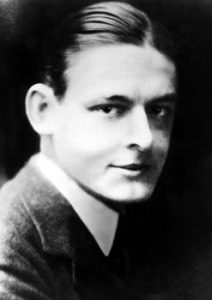Remembering T. S. Eliot:
September 26, 1888–January 4, 1965
Greg Johnson
Thomas Stearns Eliot was one of the 20th century’s most influential poets, as well as an essayist, literary critic, playwright, and publisher. He won the Nobel Prize for literature in 1948. Born in St. Louis, Missouri, from old New England stock, Eliot emigrated to England in 1914 and was naturalized as a British subject in 1927.
His principal poems are “The Love Song of J. Alfred Prufrock” (1915), “The Waste Land” (1922), “The Hollow Men” (1925), “Ash Wednesday” (1930), and “Four Quartets” (1945). His best-known play is Murder in the Cathedral (1935).
Eliot, like Ezra Pound, W. B. Yeats, Knut Hamsun, Wyndham Lewis, and many other great writers of the 20th century, was a man of the Right, although he never crossed “the line” into overt fascism. To learn more about his life, work, and metapolitical significance for the New Right, I recommend the following works published on this site:
- Kerry Bolton, “T. S. Eliot,” Part 1, Part 2, also included in More Artists of the Right
- Jonathan Bowden, “T. S. Eliot,” Part 1, Part 2, Q&A
- Jonathan Bowden, “T. S. Eliot: Ultraconservative Dandy“
- Christopher Pankhurst, “Little Gidding“
- Quintilian, “Why I Write: Putting the Pieces Back Together“
The best collections of Eliot’s writings are The Complete Poems and Plays: 1909-1950, which is not actually complete, but the best one-volume selection; Selected Prose of T.S. Eliot, which is a good selection of his literary criticism, and Christianity and Culture, his principal work on religion and culture.
Remembering%20T.%20S.%20Eliot%3ASeptember%2026%2C%201888%E2%80%93January%204%2C%201965
Enjoyed this article?
Be the first to leave a tip in the jar!
Related
-
Counter-Currents Radio Podcast No. 583: Judd Blevins on His Recall and Pro-White Politics
-
Remembering Sam Francis (April 29, 1947–February 15, 2005)
-
Nowej Prawicy przeciw Starej Prawicy Rozdział 2: Hegemonia
-
Nowej Prawicy przeciw Starej Prawicy, Rozdział 1: Nowa Prawica przeciw Starej Prawicy
-
Nowej Prawicy przeciw Starej Prawicy: Wprowadzenie
-
Nowej Prawicy przeciw Starej Prawicy: Przedmowa
-
Notes on Plato’s Alcibiades I Part 2
-
Earth Day Special

3 comments
I remember reading The Waste Land in college in an upper level lit class and having a class discussion about the portions of the poem that were a rallying cry against the emptiness and spiritual decay represented by the Gilded Age and the rise of mass pop culture (this was in the 1990s, right when PC was really starting to creep into higher learning but before it was so ubiquitous that every single class discussion was about muh racism). It really struck me at the time how difficult it must have been for a genuine man of letters like Eliot to see the changes the culture was undergoing at the time. I can’t even imagine what he would have made of America (and all of the west, for that matter) in 2021. I’m glad for his sake that he didn’t live to see it.
Reading Eliot back in my university days, I remember being shocked at his opinion that a Christian civilization could not function with the presence of “a large number of free-thinking Jews.”
I’m not shocked anymore.
Evelyn Waugh. Just finished the book Black Mischief. Basil Seal must have been a template for Flashman.
Comments are closed.
If you have Paywall access,
simply login first to see your comment auto-approved.
Note on comments privacy & moderation
Your email is never published nor shared.
Comments are moderated. If you don't see your comment, please be patient. If approved, it will appear here soon. Do not post your comment a second time.